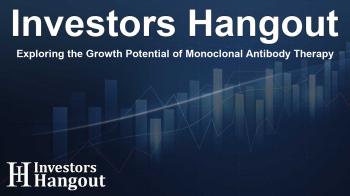Exploring the Growth Potential of Monoclonal Antibody Therapy

Understanding Monoclonal Antibody Therapy
Monoclonal antibody therapy is revolutionizing the healthcare landscape by offering targeted treatment options for various chronic diseases. As we look at the market, it's not only fascinating but also essential to understand its trajectory. The market was valued significantly in the past and is projected to grow exponentially.
Market Growth and Projections
The global monoclonal antibody therapy market is expected to witness a remarkable surge, transitioning from USD 259.36 billion in the recent past to a staggering USD 791.83 billion in the upcoming years. This reflects a strong compound annual growth rate (CAGR) indicative of robust demand and innovative advancements in the sector.
Investment Dynamics and Market Drivers
Key drivers for this growth include the rising global prevalence of chronic diseases such as cancer and autoimmune disorders. With increasing investments in biopharmaceuticals, the industry is witnessing a resurgence in innovation through novel drug development and personalized medicine approaches. Companies are increasingly focusing on antibody-drug conjugates (ADCs) and next-gen antibody platforms, enhancing the therapeutic landscape.
Market Overview and Application Benefits
Monoclonal antibodies are engineered proteins tailored to mimic the immune response, enabling targeted action against harmful pathogens and abnormal cells. Their effectiveness in treating conditions like cancers and autoimmune diseases has propelled their widespread adoption, transforming patient outcomes and setting new standards in treatment protocols.
Demographics and Regional Growth Trends
The North American market leads in terms of market share, fueled by a sophisticated healthcare system and a strong portfolio of biopharmaceutical companies. The region is characterized by a high demand for innovative therapies and a growing awareness of the benefits associated with monoclonal antibody treatments. Meanwhile, the Asia Pacific region is positioned to register the fastest growth due to expanded access to healthcare, an evolving biotech landscape, and a rising incidence of chronic diseases.
Type and Application Segmentation
The market can be segmented based on the types of monoclonal antibodies. Notably, human monoclonal antibodies dominate due to their safety profiles and effectiveness, while humanized monoclonal antibodies are anticipated to exhibit the fastest growth. Application-wise, oncology treatments are currently the largest segment, with a rapid increase in autoimmune-related therapies seen as a promising area for future growth.
Challenges and Opportunities Ahead
While the monoclonal antibody therapy market presents numerous opportunities, it is not without challenges. Ensuring production efficiency, regulatory approvals, and managing the complex supply chain for such biologics pose significant hurdles. However, the commitment of biopharmaceutical companies to overcome these challenges via ongoing research and collaboration remains strong.
Unique Selling Propositions of Market Reports
Market reports deliver vital insights that can aid stakeholders in understanding competitive landscapes, evolution in therapeutic modalities, and the importance of regulatory pathways. This intelligence is crucial for strategic planning, enabling informed decision-making in this rapidly evolving segment.
Frequently Asked Questions
What is the monoclonal antibody therapy market size?
The monoclonal antibody therapy market is projected to reach approximately USD 791.83 billion in the coming years.
What applications are driving market growth?
The major applications driving growth are oncology therapies and treatments for autoimmune diseases, which present significant market opportunities.
Which region is leading in this market?
North America currently holds the largest market share, attributed to advanced healthcare systems and research initiatives.
What technological advancements are influencing the market?
Innovations in biopharmaceutical technologies, particularly in antibody-drug conjugates and bispecific antibodies, are significantly influencing market dynamics.
How does personalization affect monoclonal antibody treatment?
Personalized therapy approaches enhance treatment efficacy by tailoring monoclonal antibody treatments to individual patient profiles, improving outcomes.
About The Author
Contact Hannah Lewis privately here. Or send an email with ATTN: Hannah Lewis as the subject to contact@investorshangout.com.
About Investors Hangout
Investors Hangout is a leading online stock forum for financial discussion and learning, offering a wide range of free tools and resources. It draws in traders of all levels, who exchange market knowledge, investigate trading tactics, and keep an eye on industry developments in real time. Featuring financial articles, stock message boards, quotes, charts, company profiles, and live news updates. Through cooperative learning and a wealth of informational resources, it helps users from novices creating their first portfolios to experts honing their techniques. Join Investors Hangout today: https://investorshangout.com/
The content of this article is based on factual, publicly available information and does not represent legal, financial, or investment advice. Investors Hangout does not offer financial advice, and the author is not a licensed financial advisor. Consult a qualified advisor before making any financial or investment decisions based on this article. This article should not be considered advice to purchase, sell, or hold any securities or other investments. If any of the material provided here is inaccurate, please contact us for corrections.

